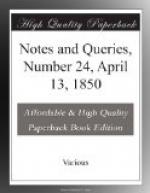Ludlow’s Memoirs.—“C.” is anxious to learn if the manuscript of Ludlow’s Memoirs is known to exist, or to receive any information as to where it might probably be found.
Ludlow died at Vevay, in Switzerland, in 1693, and the Memoirs were published at Vevay shortly after.
There is no will of Ludlow’s in Doctor’s Commons.
Finkle or Finkel.—I should be glad if any of your numerous correspondents could give me the derivation and meaning of the word Finkle, or Finkel, as applied to the name of a street. There is a street so designated in Carlisle, York, Richmond in Yorkshire, Kendal, Sedberg, Norwich (in 1508 spelt Fenkyl, and in 1702 Fenkel), and, I believe, in many other of our more ancient cities and towns. In the township of Gildersome, a village some few miles from Leeds, there is an ancient way, till lately wholly unbuilt upon, called Finkle Lane; and in London we have the parish of St. Benedict Finck, though I do not imagine that the latter is any way synonymous with the word in question. The appellation of Finkle is, without doubt, a descriptive one; but the character of the lane so styled in Gildersome seems to negative the idea that it has any reference to the peculiarity of trade or class of persons carried on or inhabiting the locality distinguished by this title.
W.M.
Cowgill, March 13. 1850.
Coxcombs vanquish Berkeley, &c.—In Lewis’s Biography of Philosophy (vol. iv. p. 7.) occurs the following quotation:—
“And coxcombs vanquish Berkeley with a grin.”
Who is the author of this line? for I cannot find it in Pope, to whom a note refers it.
R.F. Johnson.
Derivation of Sterling.—What is the derivation of Sterling? Some authors say from “Easterling,” a race of German or Dutch traders; but is it not more likely from “steer,” a bull, or ox, viz. a coin originally stamped with a figure of that animal? Of this, and parallel cases, we have many instances among the ancients. I find also, that, in a decree issued in the time of Richard I., the word is used, and explained by “peny” as a synonym. Now peny or penny is clearly from pecunia, and that from pecus, so that we have the two words brought side by side, one through the Latin, and the other through the Saxon language.
R.F. Johnson.
Hanging out the Broom.—In some parts of England a singular custom prevails. When a married woman leaves home for a few days, the husband hangs a broom or besom from the window. When, how, and where did this originate, and what does it signify?
R.F. Johnson.
Trunck Breeches.—Barba Longa.—Mercenary Preacher.—In reading Smith’s Obituary, edited by Sir H. Ellis for the Camden Society, I find the following entries:—
“1640. May 29th,
old M’r Grice, in Aldersgate S’t, who wore
trunck breeches, died.”




